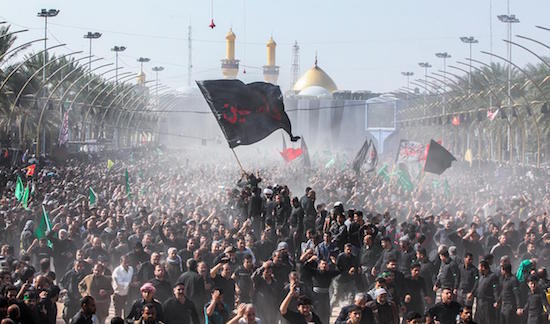Karachi: The ultimate goal is the destination when a pilgrim embarks on his journey. Not being able to complete the journey is a devastating experience — one that is even more disheartening when the person you trusted with the arrangements turns out to be a cheat.
“I did everything right, but my dream did not come true. These were the worst days of my life,” says 27-year-old Ali Zaidi, a resident of Karachi who was among the around 700 pilgrims stranded in Iran after a travel agent failed to procure visas for the forward leg of their journey that would have taken them to Iraq.
Zaidi, who had intended to travel to Karbala to observe Ashura, spent nearly 22 days in Iran with 700 others. “Thank God, I had friends and acquaintances in Iran who helped us during our stay,” he says. “I would also like to thank the Iranian government and volunteers who welcomed us with open hearts,” he added. This was not the first time that Zaidi had embarked on a pilgrimage to Iraq. It was, however, the first time he had been stranded.
Hundreds of pilgrims had booked the trip with a Karachi-based travel company, Karavan of Pride, whose offices are in Gulistan-e-Jauhar, Karachi. The company had offered the pilgrims a reasonable package to visit the holy sites in Iran and Iraq. The trip would cost Rs60,000, nearly half the average fare. “The last time, I had traveled alone, but this was my first experience with a travel agent, and it was really bad,” he reminisces. “I had approached the travel agency on a friend’s advice,” he says. “Never again will I trust a travel agency, especially this one?”
The pilgrims said that the travel agency had not obtained visas for Iraq. In the past, the Iraq-Iran border was usually open for pilgrims from Muharram 8. This time was, however, different as the border was closed due to security concerns. “The travel agent may have thought we would manage to cross the border without visas this time, too,” he reasons.
An enticing offer
Of the total 1,100 applications for the pilgrimage, 700 were accepted by the travel agency. The pilgrims hailed from Karachi and different parts of Sindh and Punjab. They were flown into Iran and were expecting to travel by road to Iraq. However, when they reached the border, they realized they could not undertake the last leg of their journey. “The border security forces did not allow us to cross over into Iraq as we had no visas,” said another young pilgrim, Asad Ali. “I had wished to observe Ashura in Iraq but had no money to do so.” Ali, too, had been enticed by the cheap offer. “I was so happy to be able to go on the pilgrimage as this was something I could afford,” he says. “Maybe fate had other plans.”
The pilgrims stayed nearly two to three days at the Iran-Iraq border and returned to Qum or Mashhad in Iran, where they spent over two weeks before returning to Pakistan. “I don’t think it would be fair to call it pre-planned cheating,” says another pilgrim, Nisar Mehdi. Instead, I think it was just bad luck,” he reflects. “Before we embarked on the journey to the Iraq border, we were well taken care of and had reasonable accommodation and food,” says Mehdi. “We have no qualms about the services provided to us in Iran. We are just unhappy that we could not achieve our aim.”
The pilgrims stayed at imambargahs and other places in Iran, where they were provided shelter and food by the Iranian government and volunteers. “We had become a family. All of us supported each other. The younger men and women did not have any problems, but the disabled and elderly did suffer quite a bit,” he explains.
Though all the pilgrims trapped have returned to Pakistan safely, the proprietor of the travel agency has disappeared since.






